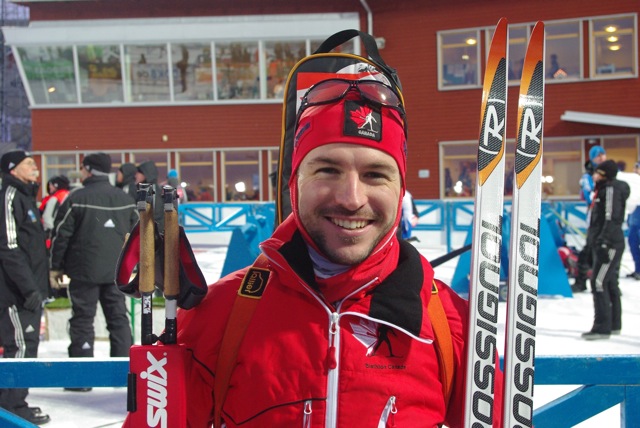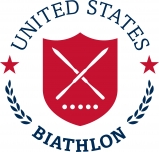
As the FIS Cross Country World Cup descends on Quebec, there’s another Canadian governing body that is hoping that fans and sponsors will remember its’ athletes successes this weekend – Biathlon Canada. Quebec native Jean Philippe Le Guellec became the first Canadian man to stand on the IBU World Cup podium, much less at the top of it, on Saturday.
In fact, the success of Canada’s ski team, which is surely one reason that Quebec and Canmore were able to draw these World Cups, is one thing that inspired Le Guellec. He wanted to begin to match the success of the skiers, who have gained media attention, popularity, and funding from their exploits.
“We’ve been looking at the cross country guys – Devon Kershaw, Alex Harvey, and a lot of the team actually have cracked the podium in the last couple years,” Le Guellec said during a press conference after his 18-second sprint victory in Östersund, Sweden. “It’s really great to be able to do this on the biathlon side too, and I really hope that it carries out throughout the season and throughout the years.”
And while it is, frankly, beyond unlikely that biathlon’s top circuit will make a stop in the French-speaking province anytime soon, in some ways the sport in Canada owes a debt to Quebec more than any other province. Before Le Guellec, the last World Cup winner was Myriam Bédard, another Quebec native; of the three Canadians who have made it to the podium, only Zina Kocher is from outside the province, growing up in Alberta.
“Granted, we’re only talking about three individual athletes here – two out of three is not a pattern, necessarily,” Biathlon Canada High Performance Director Chris Lindsay told FasterSkier in a phone interview on Monday.
But pattern or no, Quebec is a unique place for sport in Canada, and nordic sports in particular. The current success of Le Guellec, Alex Harvey, and other Quebec natives comes as no surprise to Lindsay, who spent time in the province himself when he was training as an athlete.
“The values espoused by the Quebec culture are much more conducive to being supportive of small-town sport, regional sport, and provincial sport,” Lindsay said. “I see a lot of similarities with how a local community in the United States would be able to support their team, maybe a local football team, where they can go out and actually get tangible support from the community. There’s the sense that the community will take ownership of this, because it’s people in the community who are participating.”
Le Guellec picked up biathlon in 1999, the year that Bédard, a bronze medalist in the 1992 Olympics and then a double gold medalist in 1994, retired; he and the other Quebec biathletes work for much of the year at a venue bearing her name, the Myriam Bédard Training Centre at Valcartier, outside of Quebec City. Lindsay drew parallels between the support given to the two World Cup winners.
“Myriam’s success was partly because Myriam was Myriam, and she was an extraordinary athlete,” he said. “But also because there were mechanisms early on in her career which allowed her to be successful and to continue the sport and be well-supported. And I think you see the same thing with JP…. In Quebec you see an understanding that through participation in sport, and excellence in sport, we are promoting ourselves and we are reinforcing our understanding of who we are.”
A New Hero?
Lindsay hopes that Le Guellec can achieve something else that Bédard did, as well – inspiring a generation of athletes to consider biathlon, and to believe that success is possible.
“We are very hopeful that JP becomes one of the symbols that Myriam was,” Lindsay said. “One of the reasons that JP got into the sport was because of the success and notoriety of Myriam Bédard…. We got very close to having that sort of hero status for JP at the Vancouver Olympics in 2010 [where he finished sixth], but we weren’t quite there. So hopefully this is coming full circle.”
In Canada, Bédard’s fame has almost faded. Lindsay estimated that most athletes have a memory of one or two Olympic cycles; if they don’t make the national team, eight years is about the point where they leave the junior ranks and consider college, either leaving high-level sport completely or perhaps focusing on cross country skiing. In fact, many young biathletes weren’t even born yet when Bédard was winning her medals.
For Le Guellec, putting Canadian biathlon back on the world stage has been a major goal.
“The implications of yesterday, the consequences of that, I’m totally on board with,” Le Guellec told FasterSkier after Sunday’s pursuit in Östersund. “It’s what I’ve been working on all these years, essentially, to prove that Canadians can be up there. Tim [Burke] proved it [for the U.S.] two years ago being the leader before Christmas, and it was time for a Canadian to do that too. So North America can be up there.”
(Americans agreed: “That was an awesome day for North America,” U.S. biathlete Susan Dunklee said after her own sprint race on Saturday. “We know what it’s like, and that’s a huge step for [Canada], because I don’t know if that’s been done before. It’s really cool.”)
At the grassroots level of the sport, getting people involved – particularly kids – is something that Biathlon Canada actually excels at as a national body. Over 60 clubs are spread across the country, with several thousand athletes, coaches, and officials, and a “cadet” program that involves thousands more through the Royal Canadian Air, Army, and Sea Cadets program. In comparison, the U.S. Biathlon Association has just a few hundred members race each season.
But the governing body wants more, and the high performance director hopes that Le Guellec’s performance can help the sport snag some more participants. At the very least, it has garnered more exposure for a little-known sport in the country.
“We’ve enjoyed in the past weekend what I would call almost unprecedented media coverage,” Lindsay said. “We’ve been national news on each of our national sports networks and a lot of our regular broadcast networks have picked up the story. It has really been remarkable to see this level of support for any nordic sport, but especially biathlon, because we’re just not used to it.”
Realistically, though, Lindsay knows that the team is going to have to keep the strong performances coming if it wants to stay in the public eye. (To outside observers, for instance, the FIS World Cup racing in Quebec and Canmore will quickly take the spotlight away from the biathlon team’s success.) Luckily, success within a team can feed on itself, and the rest of the biathletes are ready to deliver.
“When someone is doing well on the team, it pumps everyone up, and I think that really motivates everyone to give everything they have on race day,” Kocher said on Saturday after placing 10th in her own race; she’s aiming to get back on the podium for the first time since 2006.
Money Troubles, But No Quick Fix
It’s not just fans and potential athletes that will be looking for another World Cup victory to inspire them, however. Biathlon Canada just this spring saw a budget cut from Own the Podium, a joint public-private partnership in Canada that targets funding towards the national teams most likely to win medals at World Championships and Olympic Games.
While having an actual World Cup winner should definitely help Biathlon Canada state its case for getting their funding back – and maybe more – it’s not so simple. Own the Podium looks primarily at World Championships and Olympic performances, for one thing. But for another, funding is doled out on a comparative basis, so if other sports have good seasons too, well, the biathletes might have to do much more to earn their salaries.
“The reality of the Own The Podium situation is that they have limited funding, and we have a number of winter sports,” Lindsay said, sounding weary. “The winter sports that are demonstrating that they are capable of reliably producing medals are the ones that are going to be at the head of the queue. We hope that this result helps to substantiate our claim that we have athletes who, given proper levels of support – not extraordinary, just proper – can make the jump from being a top-16 athlete to being a podium athlete.”
As Lindsay discussed this spring, it’s a constant source of frustration that biathlon – a “mature” sport, unlike, say, freestyle skiing or snowboarding, and also one where the shooting aspect creates much more variability in the number of winners compared to a pure endurance sport – doesn’t get much attention from funders. Last season, for instance, before the budget cut, Kocher, Le Guellec, and Brendan Green all achieved top-ten World Cup results. To any fan of the sport, that would indicate medal potential.
“Everyone in the nordic community recognized that JP’s multiple top-16 finishes [at the Vancouver Olympics] were remarkable, and cause for celebration, but they didn’t really match up against the snowboarders and the hockey team, the alpine skiers and curlers,” Lindsay said. “Without having someone on the podium, the reality is you’re in a different tier. Fourth place is not the same as third place.”
Canadian biathlete Megan Imrie agreed, saying that the team’s strong performances don’t always appear so impressive to spectators who are new to the sport.
“I know we’ve been really close to really good performances on a number of times, but nobody really cares about that unless you’re one, two, or three,” she told FasterSkier after the sprint on Saturday. “So having him as a World Cup winner at the first World Cup of the year is going to hopefully put biathlon up in the spotlight a little bit more.”
Lindsay said that he was “optimistic,” and that talks with Own the Podium would certainly continue. He has also been working hard trying to use Le Guellec’s win to help attract more sponsors, which the team desperately needs in the wake of the cuts.
“One of our big pitches, of course, is that we’re kind of a bargain,” he said. “The reality of our budget is that any little bit helps. And any little bit immediately has a massive effect on what we can do programming-wise in order to support even more success as we go on… but we are cognizant that it is going to take more than one weekend of results to make it really stick in people’s minds, that Biathlon Canada is an investment that could really pay off in partnership.”
For now, the team can just enjoy the spotlight for a little while longer.
“It’s been crazy,” Le Guellec told FasterSkier regarding the attention he received on Saturday. “My twitter followers doubled overnight. Definitely a lot of e-mails, a lot of facebook-posts. That was overwhelming, actually, more than any of the interviews themselves. But it was pretty cool to see all the support.”
Chelsea Little
Chelsea Little is FasterSkier's Editor-At-Large. A former racer at Ford Sayre, Dartmouth College and the Craftsbury Green Racing Project, she is a PhD candidate in aquatic ecology in the @Altermatt_lab at Eawag, the Swiss Federal Institute of Aquatic Science and Technology in Zurich, Switzerland. You can follow her on twitter @ChelskiLittle.


